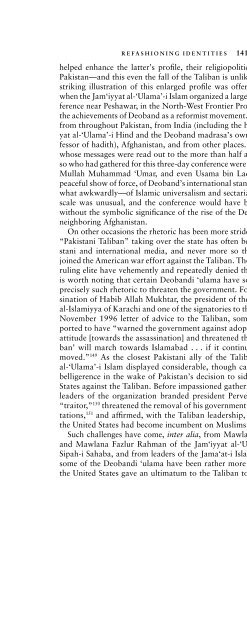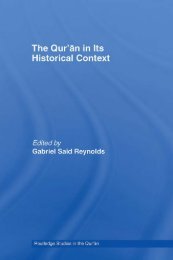Download (1 MB) - Islam and Christian-Muslim Relations: Articles ...
Download (1 MB) - Islam and Christian-Muslim Relations: Articles ...
Download (1 MB) - Islam and Christian-Muslim Relations: Articles ...
Create successful ePaper yourself
Turn your PDF publications into a flip-book with our unique Google optimized e-Paper software.
REFASHIONING IDENTITIES 141helped enhance the latter’s profile, their religiopolitical capital, withinPakistan—<strong>and</strong> this even the fall of the Taliban is unlikely to dissipate. Astriking illustration of this enlarged profile was offered in April 2001,when the Jam‘iyyat al-‘Ulama’-i <strong>Islam</strong> organized a large international conferencenear Peshawar, in the North-West Frontier Province, to celebratethe achievements of Deob<strong>and</strong> as a reformist movement. Participants camefrom throughout Pakistan, from India (including the head of the Jam‘iyyatal-‘Ulama’-i Hind <strong>and</strong> the Deob<strong>and</strong> madrasa’s own top-ranking professorof hadith), Afghanistan, <strong>and</strong> from other places. And among thosewhose messages were read out to the more than half a million people orso who had gathered for this three-day conference were the Taliban leader,Mullah Muhammad ‘Umar, <strong>and</strong> even Usama bin Laden. 146 This was apeaceful show of force, of Deob<strong>and</strong>’s international st<strong>and</strong>ing, even—somewhatawkwardly—of <strong>Islam</strong>ic universalism <strong>and</strong> sectarian amity. 147 But itsscale was unusual, <strong>and</strong> the conference would have been inconceivablewithout the symbolic significance of the rise of the Deob<strong>and</strong>i Taliban inneighboring Afghanistan.On other occasions the rhetoric has been more strident. The specter of“Pakistani Taliban” taking over the state has often been raised in Pakistani<strong>and</strong> international media, <strong>and</strong> never more so than after Pakistanjoined the American war effort against the Taliban. Though the Pakistaniruling elite have vehemently <strong>and</strong> repeatedly denied that possibility, 148 itis worth noting that certain Deob<strong>and</strong>i ‘ulama have sometimes adoptedprecisely such rhetoric to threaten the government. Following the assassinationof Habib Allah Mukhtar, the president of the Jami‘at al-‘Ulumal-<strong>Islam</strong>iyya of Karachi <strong>and</strong> one of the signatories to the aforementionedNovember 1996 letter of advice to the Taliban, some ‘ulama were reportedto have “warned the government against adopting an indifferentattitude [towards the assassination] <strong>and</strong> threatened that ‘Pakistani Taliban’will march towards <strong>Islam</strong>abad . . . if it continued to remain unmoved.”149 As the closest Pakistani ally of the Taliban, the Jam‘iyyatal-‘Ulama’-i <strong>Islam</strong> displayed considerable, though carefully calibrated,belligerence in the wake of Pakistan’s decision to side with the UnitedStates against the Taliban. Before impassioned gatherings of protestors,leaders of the organization br<strong>and</strong>ed president Pervez Musharraf as a“traitor,” 150 threatened the removal of his government through mass agitations,151 <strong>and</strong> affirmed, with the Taliban leadership, that jihad againstthe United States had become incumbent on <strong>Muslim</strong>s everywhere. 152Such challenges have come, inter alia, from Mawlana Sami‘ al-Haqq<strong>and</strong> Mawlana Fazlur Rahman of the Jam‘iyyat al-‘Ulama’-i <strong>Islam</strong>, theSipah-i Sahaba, <strong>and</strong> from leaders of the Jama‘at-i <strong>Islam</strong>i. 153 Once again,some of the Deob<strong>and</strong>i ‘ulama have been rather more ambivalent. Afterthe United States gave an ultimatum to the Taliban to turn over Usama



